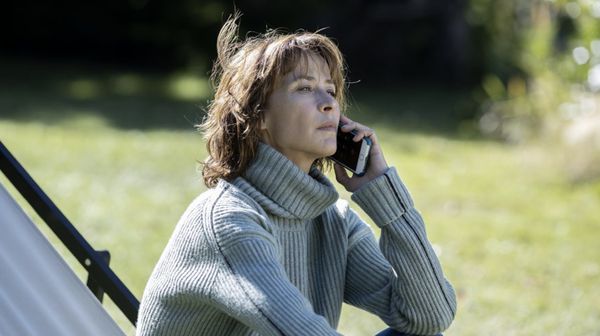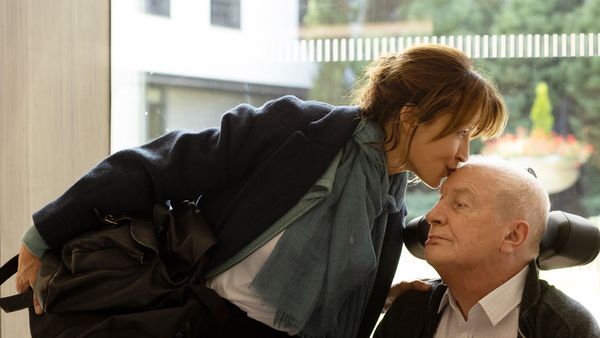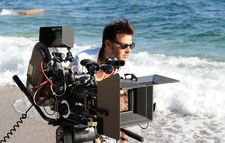 |
| Sophie Marceau: 'What really attracted me was the way of treating a difficult subject in a completely pragmatic and practical way' Photo: UniFrance |
She has the perfect excuse: she plays one of two sisters (the other is Géraldine Pailhas) whose 85-year-old father (André Dussollier) ask them to help him to end his life in François Ozon’s Everything Went Fine (Tout c’est bien passé), which is screening at Glasgow Film Festival on March 11 and 12 and, as part of New York's Rendez-vous with French Cinema on March 7.
Ozon was able to persuade Marceau, 55, to return to the big screen after a lengthy absence to join the cast of his adaptation of the autobiographical book by Emmanuèle Bernheim, who had helped her own father to die. She was a friend and collaborator with the director on such films as Swimming Pool and Under The Sand but sadly died in 2017.
Although Marceau had crossed paths with the director they had never previously discussed working together. On one occasion she had told him how much she appreciated his 2007 film Angel about the kitschy romantic novelist from the Edwardian era Angel Deverell. Marceau recalls: “He said it was one of his films that he disliked intensely … so it was obvious we were not on the same wavelength at the time.” In the intervening years any differences appear to have vanished.
“There is nothing you can do about death - it comes to us all but we talk about it less and less. We talk more about eternal youth than our own mortality. I laughed a lot at the character of the father in the film because he is someone who is free. He says exactly what he wants to say and annoys the whole world. He’s a manipulator and a consummate liar. For an actor it is great to play opposite those emotions. Everything revolves around him.” Marceau takes the role based on Bernheim herself.
Ozon, who has declared his support for the legalisation of assisted suicide in France, shouldered the camera himself to be close to his actors. Marceau found the process reassuring. She says: “With all the technical advances most shoots these days are less cumbersome. The camera is less visible and you can go much faster. François likes to be close to his actors so it seemed natural that he would want to be behind the camera himself - it’s the closest he can get to you.
“It helps us because we know that he is the first person to see us. I like having a dedicated camera person too but it makes for a different kind of rapport and relationship. It’s all a question of looks, light, and subtleties - like a romantic or intimate encounter almost.”
Explaining her recent work absences, she declares that it was more due to a lack of desire to work on her part rather than a shortfall of offers. “A film requires two or three months' work, which I know isn’t enormous. But you play with reality, not just the reality of the film but also the reality of the shoot. There is no way I could do three or four films a year. I need to get back to real life in the meantime. If you don’t have that all-consuming desire then this can be the most shitty job in the world. The same goes for directing - to get back to writing I have to find the right subject or material.”
You can understand her concern about making the right choices. She’s been acting since she was 13 when she made the cult youth hit La Boum which captured the mood of a generation in France in similar style to Saturday Night Fever or Risky Business.
She was encouraged in her endeavours by her Parisian restaurateur parents, who urged her to respond to a small ad placed by the director Claude Pinoteau. Inevitably a sequel followed two years later for which she won a best newcomer César (the French equivalent of the Oscars).
 |
| Sophie Marceau and André Dussolier. Marceau: 'The character of the irascible father gave the film a lot of humour, complicity and a sense of freedom' Photo: UniFrance |
“I’ve always been serious about my work, even as a child. I’ve been doing the same job for 40 years. I hope I have evolved and changed because as your work improves you improve as a human-being. If you achieve everything at once, it would be boring,” she says.
She has never been afraid to speak her mind, frequently falling out with directors and co-actors. She failed to see eye to eye with Maurice Pialat when she made Police and she was at daggers drawn with Bertrand Tavernier over the swashbuckling epic Revenge Of The Musketeers and with director Véra Belmont over Marquise.
She has become much more circumspect about choosing her collaborators. “You should only work with people with whom you share a sense of aesthetics or a similar attitude to life,” she says.
Marceau, her face framed by her perpetually long brown hair, has an ability to bounce back. Her experiences outside France to date appear to have been much happier. When Mel Gibson asked her to play Princess Isabelle in Braveheart she had no hesitation. “She was a woman who knew nothing about life life until she discovered love, liberty and a cause. And how could anyone say no to Mel Gibson?”
Gibson had chosen her because “she works in an expressive way, has a lot of elegance, and a lovely face which by turns is sensitive and vulnerable.” Her experience on the Bond movie, The World is Not Enough, was equally felicitous. While she recognised it as a Pierre Brosnan vehicle, it gave her a much more sinewy role than is usual for the run of 007 babes.
For a while she was dissatisfied with the kind of films she was being offered in France. “I was tired of being squeezed into “ugly, dirty, second-rate roles” that “serve the fantasies of some guy.” Men, she asserts, often write parts for women without any real understanding. “I had a run of seven period movies in a row, and wearing those corsets all the time became unbearable.”
Ask Marceau to contemplate her ideal exit from this mortal coil and she rallies energetically. “I wouldn’t like to die in my sleep. That would be out of the question. I would like to die in the daylight and fully conscious. It would be a beautiful day and I would be surrounded by friends. That would be perfect.”
Everything Went Fine is on release by Curzon UK and Ireland from 6 May. Screening as part of UniFrance's Rendezvous with French Cinema on 7 March at 6.00pm at the Walter Reade Theatre at Lincoln Center in New York. It will also screen as part of Keswick Film Festival at Alhambra Cinema on 26 March. Richard Mowe talked to Sophie Marceau during the Paris Rendezvous with French Cinema at the start of the year.






















